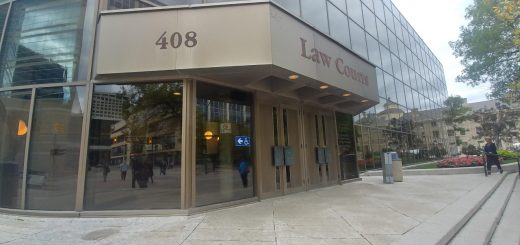Access to Justice and the Rule of Law Principle: Trial Lawyers Association v British Columbia
In its ruling in Trial Lawyers Association of British Columbia v British Columbia (Attorney General), [2014] 3 SCR 31, the Supreme Court of Canada found that court hearing fees imposed by regulation in British Columbia were unconstitutional because they interfered with access to the constitutionally protected core jurisdiction of the provincial superior courts and the rule of law as a fundamental constitutional principle.
Majority Opinion of Chief Justice McLachlin
Right of Access Is An Implicit Aspect of Core Jurisdiction of the Provincial Superior Courts Protected by Section 96 of the Constitution Act, 1867
The principal majority opinion was written by Chief Justice McLachlin (on behalf of five members of the Court). The Chief Justice’s opinion is grounded in s. 96 of the Constitution Act, 1867. In previous rulings, the Court has interpreted s. 96 as protecting the “core jurisdiction” of provincial superior courts from legislative interference. The Chief Justice took this line of cases a step further, holding that the constitutionally guaranteed core jurisdiction of provincial superior courts entails a right of access to those courts:
The historic task of the superior courts is to resolve disputes between individuals and decide questions of private and public law. Measures that prevent people from coming to the courts to have those issues resolved are at odds with this basic judicial function. The resolution of these disputes and resulting determination of issues of private and public law, viewed in the institutional context of the Canadian justice system, are central to what the superior courts do. Indeed, it is their very book of business. To prevent this business being done strikes at the core of the jurisdiction of the superior courts protected by s. 96 of the Constitution Act, 1867. As a result, hearing fees that deny people access to the courts infringe the core jurisdiction of the superior courts. (para 32)
The Chief Justice insisted that her reasoning was consistent with Justice Major’s opinion in R v Imperial Tobacco Canada Ltd, [2011] 3 SCR 45, because it is grounded in the requirements that flow by necessary implication from an express provision of the text, namely s. 96 (para 37).
Access to the Courts and the Rule of Law Principle
The rule of law principle was not the basis of the Chief Justice’s conclusion quoted above, but it did play an important supporting role in her opinion. After noting that her reasoning based on s. 96 was sufficient to find the court hearing fees unconstitutional, she noted that the connection between access to justice and s. 96 is supported by the rule of law. She cited the Court’s earlier ruling in BCGEU v British Columbia (Attorney General), [1988] 2 SCR 214, for the proposition that “access to the courts is essential to the rule of law” (para 38). She continued:
[39] The s. 96 judicial function and the rule of law are inextricably intertwined…As access to justice is fundamental to the rule of law, and the rule of law is fostered by the continued existence of the s. 96 courts, it is only natural that s. 96 provide some degree of constitutional protection for access to justice. [40] In the context of legislation which effectively denies people the right to take their cases to court, concerns about the maintenance of the rule of law are not abstract or theoretical. If people cannot challenge government actions in court, individuals cannot hold the state to account ― the government will be, or be seen to be, above the law. If people cannot bring legitimate issues to court, the creation and maintenance of positive laws will be hampered, as laws will not be given effect… [41] This Court’s decision in Christie does not undermine the proposition that access to the courts is fundamental to our constitutional arrangements. The Court in Christie — a case concerning a 7 percent surcharge on legal services — proceeded on the premise of a fundamental right to access the courts, but held that not “every limit on access to the courts is automatically unconstitutional” (para. 17). In the present case, the hearing fee requirement has the potential to bar litigants with legitimate claims from the courts. The tax at issue in Christie, on the evidence and arguments adduced, was not shown to have a similar impact. [42] … The right of the province to impose hearing fees is limited by constitutional constraints. In defining those constraints, the Court does not impermissibly venture into territory that is the exclusive turf of the legislature. Rather, the Court is ensuring that the Constitution is respected.
Superior Court Hearing Fees Unconstitutional
The Chief Justice went on to find that court hearing fees are unconstitutional if they “cause undue hardship to the litigant who seeks the adjudication of the superior court” (para 45). This would be so for impoverished or other litigants who have to “sacrifice reasonable expenses in order to bring a claim” that is neither frivolous nor vexatious (para 46). In short, litigants cannot be prevented from accessing the courts because they cannot afford fees imposed by the government (para 49). The hearing fee at issue had this impermissible effect, because it lacks an exemption for litigants of modest means (exempting only the “impoverished”), and thus “prevents access to the courts in a manner inconsistent with s.96 of the Constitution [Act, 1867], and the underlying principle of the rule of law” (para 64).
As a result, the Chief Justice declared the hearing fee scheme set out in the BC regulations to be of no force and effect, leaving it to the legislature (or the Cabinet) to enact new provisions if it chooses (para 68).
Concurring Opinion of Justice Cromwell
Justice Cromwell wrote a separate concurring opinion reaching the same result – that the hearing fees should not be interpreted as impeding access to the courts – but reached that result without relying on constitutional principles, concluding that the regulation imposing the fees was not authorized by the applicable legislation, the Court Rules Act (para 78).
Dissenting Opinion of Justice Rothstein
Justice Rothstein wrote a strong dissent, adhering to a line of reasoning similar to that followed by the Court in Imperial Tobacco and British Columbia (Attorney General) v Christie, [2007] 1 SCR 873. His emphasis was on the democracy principle and he disagreed with the use of the rule of law principle in the Chief Justice’s opinion (para 99). In his view, since “there is no express constitutional right to access the civil courts without hearing fees” (para 81), the majority usurped the role of the democratically elected legislature by creating one (para 82). “Courts do not have free range to micromanage the policy choices of governments acting within the sphere of their constitutional powers” (para 80).
Like Justice Major in Imperial Tobacco, Justice Rothstein emphasized the primacy of the constitutional text and questioned the use of fundamental principles to fill gaps in the text. “Gaps do not exist”, he remarked pointedly, “simply because the courts believe that the text should say something that it does not” (para 91). By relying on the rule of law principle to extend the meaning of s. 96, in his view “the majority subverts the structure of the Constitution and jeopardizes the primacy of the written text” (para 93).
Justice Rothstein adhered to the limits on the rule of law principle articulated in previous decisions (paras 99-102), relying particularly on Justice Major’s opinion in Imperial Tobacco. Since the hearing fee scheme is a regulation adopted pursuant to legislation enacted by the legislature, “the rule of law does not demand that this Court invalidate the hearing fee scheme — if anything, it demands that we uphold it” (para 99).
Comments
The majority opinion in Trial Lawyers Association is an important advance in constitutional protection of access to justice. The Chief Justice’s opinion prevents governments from imposing barriers to access to justice to the superior courts, measured by the standard of whether they impose “undue hardship” on litigants. Moreover, the Court has adopted new interpretations of s. 96 and the rule of law principle that future litigants will seek to build upon.
The manner in which the Chief Justice distinguished the Christie and Imperial Tobacco rulings was not particularly persuasive. We are left with significant uncertainty in predicting when the Court will be willing to use unwritten principles to create novel interpretations of constitutional provisions, or to fill gaps in the constitutional text.
The Court’s conception of access to justice is anchored firmly in a negative rights paradigm, one that prevents governments from actively imposing barriers on access to justice. Nothing in her opinion imposes positive obligations on governments to facilitate access to justice by removing barriers to participation (by, for example, adequately funding legal aid in family law matters). Nor does her opinion speak to the barriers to access to justice flowing from the cost of lawyers’ fees. The hearing fee incurred by Ms Vilardell in her case was substantial ($3,600), but was only a fraction of the legal fees she incurred ($23,000). What are the implications for the legal profession of the rule of law and access to justice concerns articulated by the Chief Justice?
The Chief Justice’s opinion is carefully crafted, through its reliance on s. 96, to apply only to provincial superior courts. What about other courts that, unlike s.96 courts, do not enjoy constitutional protection of their “core jurisdiction” (like the Federal Courts or provincial inferior courts)? Since those courts’ jurisdiction is not protected by the constitution, will the rule of law principle alone be sufficient to make the reasoning in Trial Lawyers Association applicable to them? The Chief Justice’s opinion leaves this question open.
What about the Supreme Court of Canada itself? In the Reference re Supreme Court Act, ss 5 and 6, [2014] 1 SCR 433, the Court found that its “essential features” are now constitutionally entrenched, including “the Court’s jurisdiction as the final general court of appeal for Canada” (para 94). It is likely, therefore, that any attempt by Parliament or the government of Canada to put in place barriers that cause “undue hardship” for litigants seeking to have issues adjudicated by the Supreme Court of Canada would similarly be found to be unconstitutional.







Join the conversation